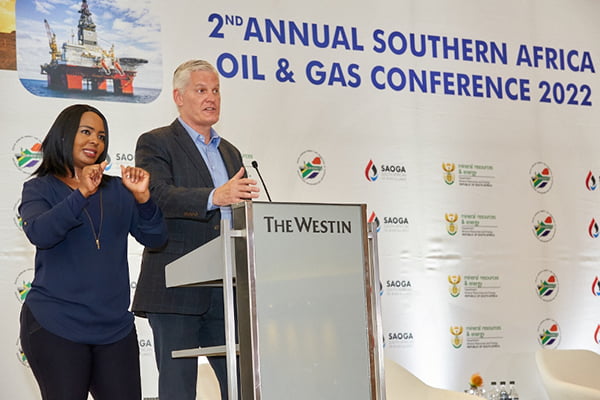The Editor’s observations from the 2nd Annual Southern Africa Oil & Gas Conference 2022
DMRE, (Dept, Mineral Resources & Energy) PASA, (Petroleum Agency SA) and SAOGA (South African Oil & Gas Alliance) partnered again to present the 2nd Annual Southern Africa Oil and Gas Conference on 15 and 16 September 2022 at the Westin Hotel in Cape Town. The conference which attracted more than 170 in person and virtual delegates was addressed by more than 30 eminent speakers and provided a critical platform to engage with topical key issues, challenges, and opportunities of the local and regional industry with the objective of restoring investor confidence while providing networking opportunities.
The conference topics included:
- Petroleum prospectivity, recent oil and gas discoveries, legislative changes in the region. Upstream oil and gas investment opportunities in the region.
- Policy options and possible energy pathways identified in the IEA Africa Energy Outlook 2022. Oil and Gas projects development in the context of energy transition.
- Socio-economic benefits of selected projects.
- Technologies to reduce negative impacts of oil and gas activities on the environment; and Progress on the development of the Ocean Economy Master-plan.
This event supplemented similar initiatives that were often not accessible to local companies, especially those from previously disadvantaged groups, trying to build a presence in the exploration and service industries. The event improved access and provide networking opportunities between local, regional, and global role-players in the oil and gas industry.
Some highlight presentations included:
- New Exploration Opportunities & Recent Advances in SA;s Offshore & Onshore basins by Bongani Sayidini, CEO of PASA, who detailed the Region’s huge and largely untapped indigenous oil and gas resources and their potential to make South Africa and its near neighbours independent of imported oil and gas. He also highlighted the administrative hurdles and constraints to future development.
- The keynote address on Day 2 by Andre de Ruyter, Eskom CEO who laid out Eskom’s vision of embracing gas to power as a partial solution to the country’s energy shortfall. These included the upgrade of existing OCGT power plants to more efficient combined cycle and gas powered plants, new 3 000MW gas fired CCGT capacity in Richards Bay, and the possible repurposing of existing coal fired power stations to natural gas. However, with the proviso that turbine efficiency losses at altitude of 20% mitigated against this on the Highveld and a more pragmatic option was to generate at sea level and ‘import electrons’ to higher altitude locations from coastal areas. Options identified included from within SA and potentially, from jointly developed gas fired power stations in gas rich Mozambique via the existing Mozal transmission line.
- Presentations by: Neil Hodgson, Vice President of Searcher, Dennis Zekveld, Country Chairman Shell Namibia E&P and Paul Eardley-Taylor, Head of Oil & Gas Southern Africa at Standard Bank. All speakers described in detail the huge oil and gas potential of onshore and particularly, offshore finds in the Orange, Outeniqua and East Coast Basins, sighting the discoveries in Venus and Graff (Namibia) fields on the West Coast, The Luiperd, Brulpadda and blocks 11B/12B discoveries in the Outeniqua Basin and the largely undiscovered areas of potential in the Durban and Zululand Basins.
Government dragging its feet?
All speakers reinforced the exciting potential of oil and gas developments in the region but several speakers voiced concerns over the apparent lack of communication between government agencies and the inordinate amount of red tape and time taken to obtain licencing and permits including visas and work permits for foreign specialists.
One speaker quoted the time taken for a permit to be obtained from the Dept. Water and Sanitation, which took 300 days to process. Speakers were enthusiastic of the interactions they had had with the Namibian authorities and the efficiency their requests had been dealt with. Guyana was sighted as an example of as small country where its efficient administration had exploited oil discoveries and turned them very quickly into meaningful production.
A lesson to be learned?
